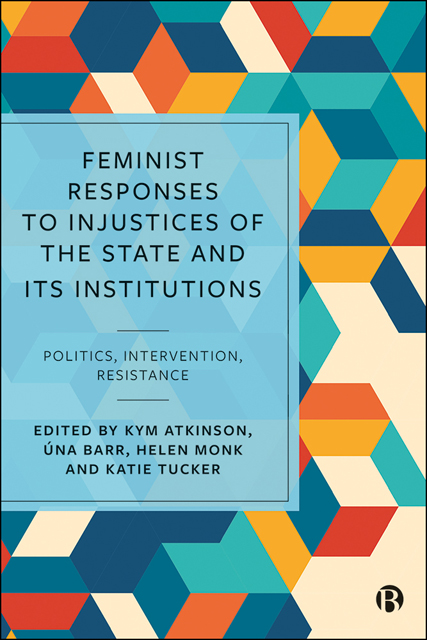 Feminist Responses to Injustices of the State and Its Institutions
Feminist Responses to Injustices of the State and Its Institutions 12 - An Anti-Carceral Feminist Response to Youth Justice Involved Girls
Published online by Cambridge University Press: 17 June 2023
Summary
Introduction
Girls have consistently represented a minority of the youth offending population and their involvement in the youth justice sphere has often developed from concerns in relation to displays of ‘risky femininity’, most prominently in relation to adolescent sexuality and sexual agency. This chapter, therefore, does not intend to enter into a debate concerning the prevention, management or reduction of girls’ offending behaviour. This is not to say that girls don’t break the law, but for those that do, it is established that their offending is often accompanied by profound experiences of victimization and social, economic and material injustice and inequality. The purpose of this chapter is, therefore, to critically explore and challenge the way in which girls’ involvement in crime, and their criminalization, represents broader and more complex problems regarding their lived realities, which require a holistic and alternative response to the one currently facilitated by the youth justice service. Situating the structural inequalities and social injustice which disproportionately affect girls and young women, by virtue of age and gender (notwithstanding the intersections of class, ethnicity, disability or sexuality), at the centre of debate and discussion, the chapter advocates for the development and application of a ‘girl-wise’ penology, underpinned by an anti-carceral feminist response to the injustices girls experience at the hands of the penal estate.
In order to make the case for a ‘girl-wise’ penology, informed by an anticarceral feminist logic, the chapter will provide contextual insight into the structural position of girls, their relationship with youth justice and the ways in which policy and practice, over the past two decades, has had particularly gendered consequences for those in conflict with the law. In doing so it will draw attention to the extent to which the experiences of girls continue to be marginalized within criminological discourse and academic scholarship. Moving forward, the chapter suggests that in order to overcome such marginalization, the experiences and needs of girls, and responses to them, need to be incorporated into abolitionist and feminist praxis.
Focusing on the relative absence of radical feminist responses from existing literature concerning girls embroiled in the youth justice system, the contributions from this chapter are intended to directly address the need for a radically informed shift in the existing treatment of, and responses to, girls in the justice system.
- Type
- Chapter
- Information
- Feminist Responses to Injustices of the State and Its InstitutionsPolitics, Intervention, Resistance, pp. 235 - 255Publisher: Bristol University PressPrint publication year: 2022


